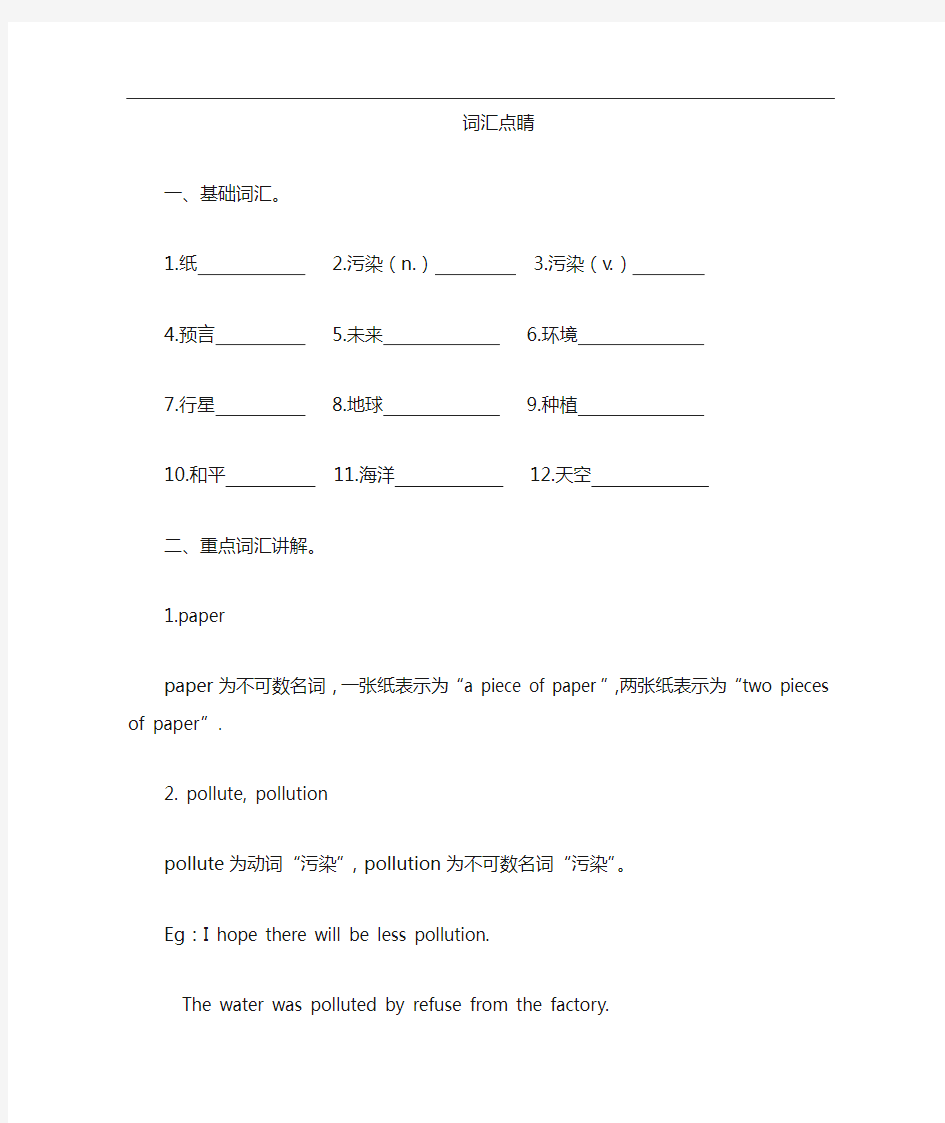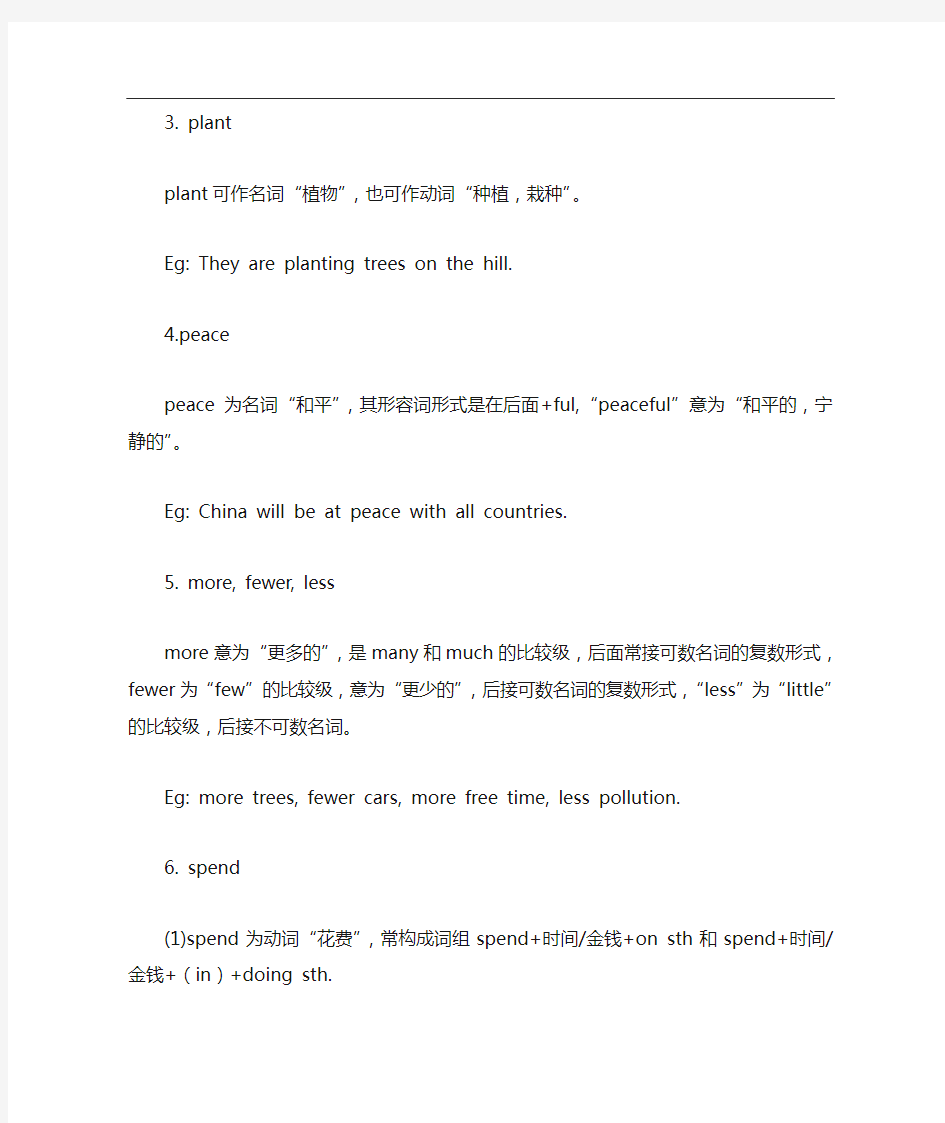

词汇点睛
一、基础词汇。
1.纸
2.污染(n.)
3.污染(v.)
4.预言
5.未来
6.环境
7.行星8.地球9.种植
10.和平11.海洋12.天空
二、重点词汇讲解。
1.paper
paper为不可数名词,一张纸表示为“a piece of paper”,两张纸表示为“two pieces of paper”.
2. pollute, pollution
pollute为动词“污染”,pollution为不可数名词“污染”。
Eg:I hope there will be less pollution.
The water was polluted by refuse from the factory.
3. plant
plant可作名词“植物”,也可作动词“种植,栽种”。
Eg: They are planting trees on the hill.
4.peace
peace为名词“和平”,其形容词形式是在后面+ful,“peaceful”意为“和平的,宁静的”。
Eg: China will be at peace with all countries.
5. more, fewer, less
more意为“更多的”,是many和much的比较级,后面常接可数名词的复数形式,fewer为“few”的比较级,意为“更少的”,后接可数名词的复数形式,“less”为“little”的比较级,后接不可数名词。
Eg: more trees, fewer cars, more free time, less pollution.
6. spend
(1)spend为动词“花费”,常构成词组spend+时间/金钱+on sth和
spend+时间/金钱+(in)+doing sth.
Eg: The man spent ¥5000 buying a bike.
(2)take也为动词“花费”,常构成词组It takes sb sometime to do sth. Eg: It takes me half an hour to walk to school.
(3)cost
cost动词“花费”,主语通常为物。
Eg: The book cost him $50.
(4)pay
pay为动词“支付”,常和介词for构成固定词组。
Eg: I paid twenty yuan for the dictionary.
7. hope
(1)hope为动词“希望,期望”,后面常接动词不定式和that从句。
Eg: I hope to see you soon.
The teacher hoped that the students would learn English well. (2)hope还可作名词“希望,信心”。
Eg: We have a hope of success.
(3)hope还可加上ful构成形容词“hope+ful”,意为“有希望的”,加上“less”构成“hopeless”意为“绝望的”。
Eg: I am hopeful of success.
The job is a hopeless case.
句型透视
一、必背句。
1. People use money. Everything will be .
2. There will be trees and the environment will be
.
3.Will we have to move to ?
4. What will the future ?
5.I think there will be cities because people will build
buildings in the country.
二、例句解析。
1. People won’t use money. Everything will be free.
人们将不会使用钱,一切都将是免费的。
(1)People won’t use money.这个句子是一般将来时的否定句,“money”为不可数名词。
(2)Everything为不定代词,作主语时,谓语动词用单数,free可作形容词“免费的”,也可作形容词“自由的”。
Eg: Everything is free, you can enjoy yourself.
When will you be free?
2. That sounds bad.
那听起来很糟。
sound为系动词“听起来”,后面接形容词,sound like意为“听起来像”,后面常接名词,类似的还有look—look like, feel—feel like等。
Eg: That sounds like a good idea.
3.Will we have to move to other planets?
我们将会搬到别的星球吗?
(1)move为动词“移动,搬动”,后面常用介词to连接表示地点的名词。
Eg: When did you move to Shanghai?
(2) other为形容词“其他的,另外的”,后面一般复数名词。
Eg: Any other suggestions?
(3)other还可以和the连用,构成“one…,the other…”后面通常接单数名词。
Eg: I have two brothers, one is a doctor. the other is a teacher.
(4)another为“又一的,再一的”,用于三者以上。
Eg: I don’t like this one, please show me another.
4.Me, too.
我也一样。
(1)Me, too在文中还可以换成so do I.
Eg: A: I am a football fan.
B: Me, too. (So am I.)
(2) too可作副词,意为“也,还”用于肯定句的句末,否定句应用either.
Eg: A: I love English. A: I don’t have a car.
B: Me, too. B: Me, either.
(3)too还译为“太,过分”常用于形容词或副词前。
Eg: You should get your hair cut, It is too long.
词汇点睛
一、基础词汇
1.宇航员
2.公寓
3.火箭
4.太空站
5.甚至
6.仆人
7.危险的8.已经9.工厂
10.简单的11.相信12.不同意
13.落下14.可能15.不可能
16.一方17.或许,大概18.假期
19.在…期间
二、重点词汇讲解。
1.even
(1)even为副词“甚至,更”,后面可接形容词的比较级。
Eg: Bob is very tall, Tom is even taller than Bob.
(2)even还可和“if”连用构成词组“even if”,相当于“even though”意为“即使”。
Eg: We’ll go even if he doesn’t come.
2.dangerous
dangerous为形容词“危险的”,其名词形式是danger,构成词组“in danger”在危险中,“out of danger”脱险。
Eg: Tigers are dangerous animals.
The doctor said that his father was out of danger.
3.already
already为副词“已经”,通常用于现在完成时放在肯定句里,否定句和疑问句中要用yet.
Eg: A: Have you finished your work yet?
B: Yes, I have finished already.
4.hundreda of
(1)hundreds of意为“成百上千的,数百的”。
Eg: There are hundred of boks in the library.
(2)hundred(百),thousand(千),million(百万)等词前有具体数字时,其本身用单数形式,直接修饰名词,但“hundred”等词可以和“many, several, some”等表示不定数目的词连用并在后面接“of+复数名词”。
Eg: There are two hundred birds in the tree.
She has several hundreds of camps.
5.fall
fall为动词“落下,跌落”,其过去式、过去分词分别为fell,fallen。常构成词组fall behind“落后”,fall off“从…掉下来”,fall asleep“入睡”。
Eg: Study hard, or you’ll fall behind others.
He fell off his bike and hurt his leg.
6.look for
look for意为“寻找”,强调寻找的过程,“find”强调寻找的结果,其宾语常为表示人或物的名词或代词,“find out”强调发现的结果,宾语常指某种现象、结论或某个问题的答案。
Eg: I’m looking for my pen, but I can’t find it.
Who found out the answer to this ques tion.
7.be able to
(1)be able to do sth有能力干某事,会干某事。
Eg: I’m able to swim.
(2)be able to和can的区别:
第一,can只能用于现在时和过去时态中,而be able to有多种时态;第二,be able to可用于不定式结构,而can不能;第三,表示猜测时,只能用can,不用be able to;第四,can无人称和数的变化,而be able to 有。
Eg: People will be able to fly to the moon on vacation.
Ann can’t ride a bike, but we are able to do it.
8. probably
(1)probably为副词“或许,大概”,常位于行为动词之前,助动词、情态动词或系动词之后。
Eg: You are probably right.
(2)maybe, perhaps也为“也许”,一般放在句首。
Eg: Maybe/Perhaps he is a policeman.
(3)may也许,放在谓语动词之前。
Eg: He may be a doctor.
9.keep
(1)keep动词“保持”、“饲养”
Eg: Keep the classroom clean
keep a dog.
(2)keep可构成词组keep sb doing sth,让某人一直干某事,keep (on) doing sth一直不断做某事。
Eg: Sorry, I kept you waiting for me for a long time.
The little girl kept reading all the time.
句型透视
一、必背句。
1. I rockets the moon.
2. ,they can help to build cars, and they do simple jobs .
3.These kinds of robots are to .
4.For example, it is easy for children to and know .
5.We never know in the future?
二、例句解析。
1.Some scientists believe that there will be more robots in the future. However, they agree it may take hundreds of years.
一些科学家相信将来会有更多的机器人,然而,他们都认为这要经历上百年的时间。
(1)however意为“然而,可是”,可与although/though转换,但however 更正式一些,一般用逗号和句子隔开。
Eg: Everyone played well, However, we still lost the game.
(2)take花费,常构成词组It takes sb sometime to do sth.
Eg: It took me twenty minutes to do the housework.
2.But scientist James white thinks it will be difficult for a robot to do the same things as a person.
但是科学家詹姆森·怀特认为对于一个机器人来说要像人一样做同样的事情将是很困难的。
(1)本句含有一个以that引导的宾语从句,宾语从句中使用了“it will be+形容词+for sb+to do sth”结构,这里it作形式主语,代替真正的主语to do the same things as a person.
Eg: It is difficult for me to finish the job in a week.
(2)it还可以放在feel, think, find后作形式宾语,真正的宾语是后面的动词不定式。
Eg: I find it easy to work out the math project.
(3)the same as和…一样的,same前常用定冠词the,此处as a person 后省略了does.
Eg:Lucy likes wearing the same clothes as I do.
3.That may not seem possible now, but computers and rockets seemed impossibe 100 years ago.
这在现在看来不太可能,但是电脑和火箭在一百年前也似乎是不可能的。
(1)possible“可能的”常构成词组as…as possible,意为“尽可能…”,相当于as…as sb can.
impossible“不可能的”和possible为反义词。
Eg: It’s impossible for him to learn English well.
(2)seem似乎,像是,常用结构:seem+adj, seem to do sth, It seems that+从句。
Eg: He seems smart.
He seems to be a teacher.
It seems that he is angry.
(3)look和seem都为看起来,look看起来似乎如此,seem指事实上似乎是那样的,暗示判断有一定根据,接近现实。
Eg:He looks old, but he seems to be much younger in red.
4. We never know what will happen in the future!
我们永远不知道未来会发生什么。
(1)happen常指具体事件的发生,多指偶然的或未能预测到的“发生”,常构成词组sth happen(s) to sb意为“某人发生某事”。
Eg: What happened to Bob?
(2)take place通常指某事按计划进行或发生。
Eg: The accident took place only a block from his home.
语法小结
1.定义:
一般将来时表示在将来某个时间要发生的动作或存在的状态。
2.时间状语:
some day, this evening, tomorrow, the day after tomorrow, in the future, next week, in 10 years, in 2020年等。
3.结构:
肯定句:主语+will/shall+动词原形
否定句:主语+will/shall+not+动词原形
一般疑问句:will/shall+主语+动词原形?
特殊疑问句:特殊疑问词+will/shall+主语+动词原形?
4.一般将来时的其他表示法。
①用现在进行时表示将来(表示按计划,安排要发生的事)。
②用be going to表示将来(表示明确打算或确信会发生)
③there be的将来时:there will be+主语+其他。
重点词汇
1. 在人们的家里in people’s homes
2.通过电脑on computers
3.活到200岁live to be 200 years old
4.有很大的危险be in great danger
5.参加play a part
6.在将来in the future
7.乘火箭飞往fly rockets to
8.在天空on a space station
9.感到厌烦get bored
10.例如for example
11.一遍又一遍over and over again
12.几百年hundreds of years
13.看起来像look like
14.醒来wake up
15.倒塌fall down
16.在上班时间during the week
17.在周末on the weekend
= on weekends
18.有天one day
19.单词的意义the meanin of words